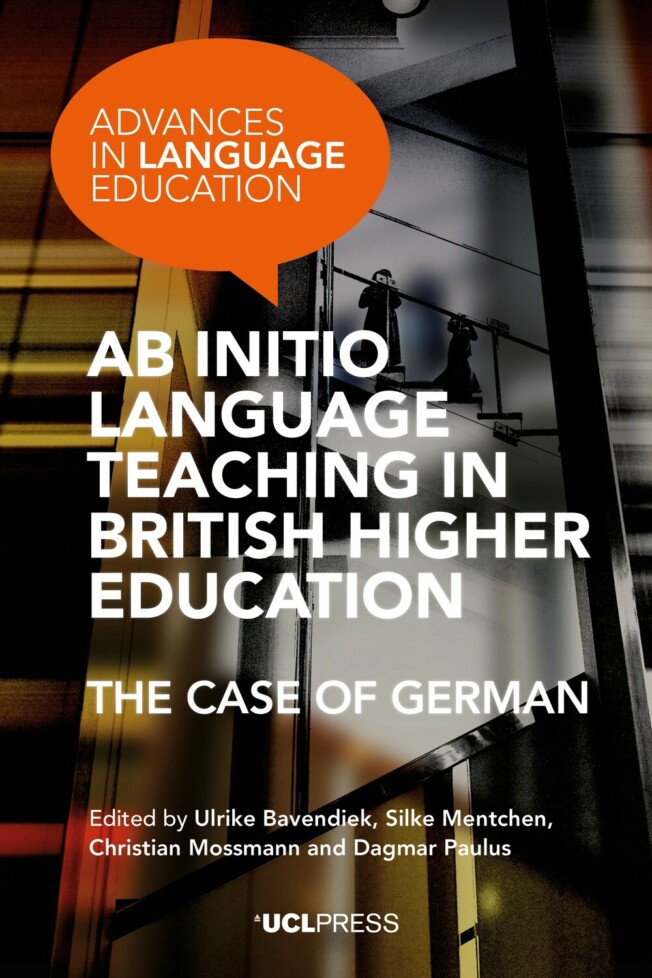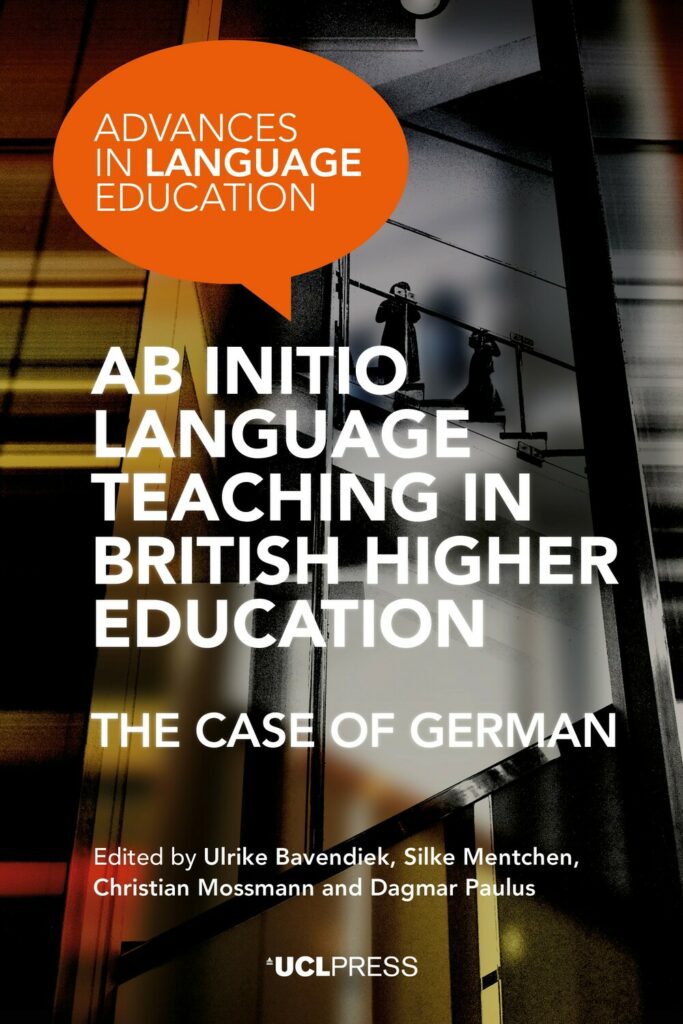
Ab Initio Language Teaching in British Higher Education
The Case of German
Ulrike Bavendiek (Editor), Ulrike Bavendiek (Editor), Silke Mentchen (Editor), Silke Mentchen (Editor), Christian Mossmann (Editor), Christian Mossmann (Editor), Dagmar Paulus (Editor), Dagmar Paulus (Editor)
Series: Advances in Language Education
Drawing extensively on the expertise of teachers of German in universities across the UK, this volume offers an overview of recent trends, new pedagogical approaches and practical guidance for teaching at beginners level in the higher education classroom. At a time when entries for UK school exams in modern foreign languages are decreasing, this book serves the urgent need for research and guidance on ab initio learning and teaching in HE. Using the example of teaching German, it offers theoretical reflections on teaching ab initio and practice-oriented approaches that will be useful for teachers of both German and other languages in higher education.
The first chapters assess the role of ab initio provision within the wider context of modern languages departments and language centres. They are followed by sections on teaching methods and innovative approaches in the ab initio classroom that include chapters on the use of music, textbook evaluation, the effective use of a flipped classroom and the contribution of language apps. Finally, the book focuses on the learner in the ab initio context and explores issues around autonomy and learner strengths. The whole builds into a theoretically grounded guide that sketches out perspectives for teaching and learning ab initiolanguages that will benefit current and future generations of students.
List of figures and tables
List of contributors
Glossary and list of abbreviations
Foreword by Martin Durrell
Editors’ introduction
Part I: Trends and developments
1 Beginners German: Ja, bitte! Development and status quo of German ab initio education in degree programmes and language centres at UK universities
Martina Wallner and Elisabeth Wielander
2 German ab initio in Languages for All programmes: Student profiles and course design
Sabina Barczyk-Wozniak
3 Preparing Generation Z students for a world of volatility, uncertainty, complexity, and ambiguity (VUCA) through language learning
Kasia Łanucha and Alexander Bleistein
Part II: Pedagogy and teaching methods
4 Reading literature in the ab initio classroom
Daniela Dora and Katharina Forster
5 Using music in ab initio courses
Kirsten Mericka
6 Grammar teaching and learning in the German ab initio classroom
Birgit Smith
7 Selecting the right resources for beginners level: A textbook evaluation
Christian Mossmann
8 Intercultural awareness in the teaching and learning of German: The case of ab initio Eva Gossner and Dagmar Paulus
Part III: Innovative approaches
9 The ‘flipped classroom’ approach in the German beginner context
Mandy Poetzsch
10 New approaches to feedback in ab initio language classes: a case study
Ruth Winter
11 Two for the price of one: Using a cognitive theory of metaphors for vocabulary teaching and learning
Silke Mentchen
12 Effective vocabulary learning apps: What should they look like? An evaluation with a particular view to German language acquisition
Annemarie Künzl-Snodgrass, Theresa Lentfort and Maren de Vincent-Humphreys
Part IV: Learner focus
13 Developing learner autonomy in German ab initio programmes
Thomas Jochum-Critchley
14 Individual Differences in ab initio language learning: Working with learners’ strengths
Ulrike Bavendiek
List of figures and tables
List of contributors
Glossary and list of abbreviations
Foreword by Martin Durrell
Acknowledgements
Editors’ introduction
Ulrike Bavendiek, Silke Mentchen, Christian Mossmann and Dagmar Paulus
Part I Trends and Developments
1 Beginners’ German – Ja, bitte! Development and status quo of German ab initio education in degree programmes and language centres at UK universities
Martina Wallner and Elisabeth Wielander
2 German ab initio in Languages for All programmes: student profiles and course design
Sabina Barczyk-Wozniak
3 Preparing Generation Z students for a world of volatility, uncertainty, complexity, and ambiguity (VUCA) through language learning
Kasia Łanucha and Alexander Bleistein
Part II Pedagogy and teaching methods
4 Reading literature in the ab initio classroom
Daniela Dora and Katharina Forster
5 Using music in ab initio courses
Kirsten Mericka
6 Grammar teaching and learning in the German ab initio classroom
Birgit Smith
7 Selecting the right resources for beginners’ level: a textbook evaluation Christian Mossmann
8 Intercultural awareness in the teaching and learning of German: The case of ab initio
Eva Gossner and Dagmar Paulus
9 The ‘flipped classroom’ approach in the German beginner context
Mandy Poetzsch
10 New approaches to feedback in ab initio language classes: a case study
Ruth R. Winter
11 Two for the price of one: Using a cognitive theory of metaphors for vocabulary teaching and learning
Silke Mentchen
12 Effective vocabulary learning apps: what should they look like? An evaluation with a particular view to German language acquisition
Annemarie Künzl-Snodgrass, Theresa Lentfort and Maren de Vincent-Humphreys
Part IV Learner Focus
13 Developing learner autonomy in German ab initio programmes
Thomas Jochum-Critchley
14 Individual differences in ab initio language learning: working with learners’ strengths
Ulrike Bavendiek
Index
DOI: 10.14324/111.9781787359260
Publication date: 01 December 2022
PDF ISBN: 9781787359260
EPUB ISBN: 9781787359291
Hardback ISBN: 9781787359284
Paperback ISBN: 9781787359277
Ulrike Bavendiek (Editor) 
Ulrike Bavendiek is Senior Lecturer in the Department of Languages, Cultures and Film at the University of Liverpool. She has taught German language and linguistics in Goethe Institutes and universities in Germany, Japan, and the UK. At Liverpool she set up and has taught German ab initio for over 20 years. Her other teaching and research interests lie in the field of Applied Linguistics. She is the director of the Centre for Teaching Excellence in Language Learning at the University of Liverpool.
Ulrike Bavendiek (Editor) 
Ulrike Bavendiek is Senior Lecturer in the Department of Languages, Cultures and Film at the University of Liverpool. She has taught German language and linguistics in Goethe Institutes and universities in Germany, Japan, and the UK. At Liverpool she set up and has taught German ab initio for over 20 years. Her other teaching and research interests lie in the field of Applied Linguistics. She is the director of the Centre for Teaching Excellence in Language Learning at the University of Liverpool.
Silke Mentchen (Editor) 
Silke Mentchen is Senior Language Teaching Officer in the Faculty of Modern and Medieval Languages and Linguistics at Cambridge University, where she has taught since 1998. She has responsibilities for the curriculum and administration of various courses, including the ab initio German one. She is co-author of an online grammar programme, textbooks, and articles on language pedagogy. She is also fellow and tutor at Magdalene College, Cambridge.
Silke Mentchen (Editor) 
Silke Mentchen is Senior Language Teaching Officer in the Faculty of Modern and Medieval Languages and Linguistics at Cambridge University, where she has taught since 1998. She has responsibilities for the curriculum and administration of various courses, including the ab initio German one. She is co-author of an online grammar programme, textbooks, and articles on language pedagogy. She is also fellow and tutor at Magdalene College, Cambridge.
Christian Mossmann (Editor)
Christian Mossmann is Senior Lecturer in Modern Languages and Cultures at the University of Exeter and Language Coordinator for German and Russian in the university’s Foreign Language Centre. He has been teaching German in the UK for over twelve years and has been responsible for setting up the German ab initio pathway for degree students at Exeter. He is also the Exeter Project Lead for the EU-funded European University Tandem (EUniTa) project.
Christian Mossmann (Editor)
Christian Mossmann is Senior Lecturer in Modern Languages and Cultures at the University of Exeter and Language Coordinator for German and Russian in the university’s Foreign Language Centre. He has been teaching German in the UK for over twelve years and has been responsible for setting up the German ab initio pathway for degree students at Exeter. He is also the Exeter Project Lead for the EU-funded European University Tandem (EUniTa) project.
Dagmar Paulus (Editor)
Dagmar Paulus is Lecturer and Language Coordinator in German Studies at University College London where she is responsible for the German ab initio programme. Previously, she taught German at the University of Nottingham and at Tomsk State University, Russia. Her latest book, Nationalism before the Nation State, was published in 2020. Her current research project is a monograph on landscape and nationalism.
Dagmar Paulus (Editor)
Dagmar Paulus is Lecturer and Language Coordinator in German Studies at University College London where she is responsible for the German ab initio programme. Previously, she taught German at the University of Nottingham and at Tomsk State University, Russia. Her latest book, Nationalism before the Nation State, was published in 2020. Her current research project is a monograph on landscape and nationalism.
Related titles
Developing the Higher Education Curriculum
Brent Carnell, Professor Dilly Fung, Professor of Higher Education Development & Academic Director UCL Centre for Advancing Learning and Teaching,
13 November 2017
Developing the Higher Education Curriculum
Brent Carnell, Professor Dilly Fung, Professor of Higher Education Development & Academic Director UCL Centre for Advancing Learning and Teaching,
13 November 2017
A Connected Curriculum for Higher Education
Professor Dilly Fung, Professor of Higher Education Development & Academic Director UCL Centre for Advancing Learning and Teaching,
07 June 2017
A Connected Curriculum for Higher Education
Professor Dilly Fung, Professor of Higher Education Development & Academic Director UCL Centre for Advancing Learning and Teaching,
07 June 2017
Shaping Higher Education with Students
Vincent C. H. Tong, Alex Standen, Mina Sotiriou,
06 March 2018
Shaping Higher Education with Students
Vincent C. H. Tong, Alex Standen, Mina Sotiriou,
06 March 2018
Ab Initio Language Teaching in British Higher Education
The Case of German
Drawing extensively on the expertise of teachers of German in universities across the UK, this volume offers an overview of recent trends, new pedagogical approaches and practical guidance for teaching at beginners level in the higher education classroom. At a time when entries for UK school exams in modern foreign languages are decreasing, this book serves the urgent need for research and guidance on ab initio learning and teaching in HE. Using the example of teaching German, it offers theoretical reflections on teaching ab initio and practice-oriented approaches that will be useful for teachers of both German and other languages in higher education.
The first chapters assess the role of ab initio provision within the wider context of modern languages departments and language centres. They are followed by sections on teaching methods and innovative approaches in the ab initio classroom that include chapters on the use of music, textbook evaluation, the effective use of a flipped classroom and the contribution of language apps. Finally, the book focuses on the learner in the ab initio context and explores issues around autonomy and learner strengths. The whole builds into a theoretically grounded guide that sketches out perspectives for teaching and learning ab initiolanguages that will benefit current and future generations of students.

